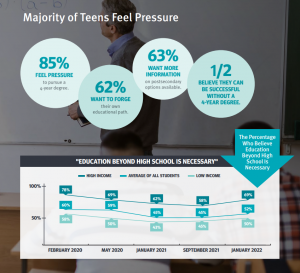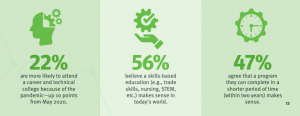![]() Advance CTE’s “Research Round-Up” blog series features summaries of relevant research reports and studies to elevate evidence-backed Career Technical Educational (CTE) policies and practices and topics related to college and career readiness.
Advance CTE’s “Research Round-Up” blog series features summaries of relevant research reports and studies to elevate evidence-backed Career Technical Educational (CTE) policies and practices and topics related to college and career readiness.
This month’s blog highlights results from the ECMC Group’s, “Question the Quo” national surveys. Conducted in partnership with Vice Media, ECMC Group launched the Question The Quo campaign to empower high school students to learn about the various postsecondary education options available and take the career path that’s right for them. This campaign supports a vision for the future of CTE where statewide systems are designed to equip learners with the knowledge they need to skillfully navigate their own career journey and utilize data to implement responsive programs.
Survey Overview
 To inform this campaign, ECMC Group has conducted five national surveys to encourage teens to evaluate education beyond high school while considering cost, parental and role model influences, and societal norms. These surveys were conducted February 2020-February 2022 and polled over 5,000 teens aged 14-18. Learners were asked to share their thoughts and plans for their future education and careers amidst an ever-changing environment marked by hybrid classrooms and a rapidly changing economy.
To inform this campaign, ECMC Group has conducted five national surveys to encourage teens to evaluate education beyond high school while considering cost, parental and role model influences, and societal norms. These surveys were conducted February 2020-February 2022 and polled over 5,000 teens aged 14-18. Learners were asked to share their thoughts and plans for their future education and careers amidst an ever-changing environment marked by hybrid classrooms and a rapidly changing economy.
Overall, the net survey findings uncovered that learners are focused on gaining the skills necessary to secure a job after graduation, and want more information on the avenues to do so. A majority (63 percent) of teens wish their high school provided more information about the variety of postsecondary opportunities available. A vast majority (89 percent) say higher education needs to make changes to place greater emphasis on career preparedness and exploration.
Key Finding: Career and technical education programs address learners’ desire for more skill-based education that aligns with the needs of the job market.
 Over half of survey responses indicated that learners view skills-based education programs (e.g nursing, STEM, trade skills, etc) as an intelligent choice in today’s labor market despite reporting a limited knowledge of CTE programs. Survey responses also showed a noticeable increase, 10 points from May 2020, in learners’ expressed likelihood to attend a postsecondary CTE institution. State leaders can leverage this type of learner data to rethink how they can assist learners in identifying the programs that will result in in-demand skill attainment.
Over half of survey responses indicated that learners view skills-based education programs (e.g nursing, STEM, trade skills, etc) as an intelligent choice in today’s labor market despite reporting a limited knowledge of CTE programs. Survey responses also showed a noticeable increase, 10 points from May 2020, in learners’ expressed likelihood to attend a postsecondary CTE institution. State leaders can leverage this type of learner data to rethink how they can assist learners in identifying the programs that will result in in-demand skill attainment.
Additional results from the most recent survey in May 2022 can be found here.
Additional Resources
State leaders can capitalize on learners’ desire to build labor market skills by utilizing effective messaging to emphasize the connection to postsecondary CTE programs. Advance CTE’s report, “Communicating Career Technical Education: Learner-centered Messages for Effective Program Recruitment” provides insights on strategies for designing tailored messaging for recruiting each learner. The accompanying message triangle serves as a guide for building effective messaging aligned with learner interests.
State CTE leaders can find these and other resources about the strategies in the Learning that Works Resource Center.
Amy Hodge, Policy Associate

